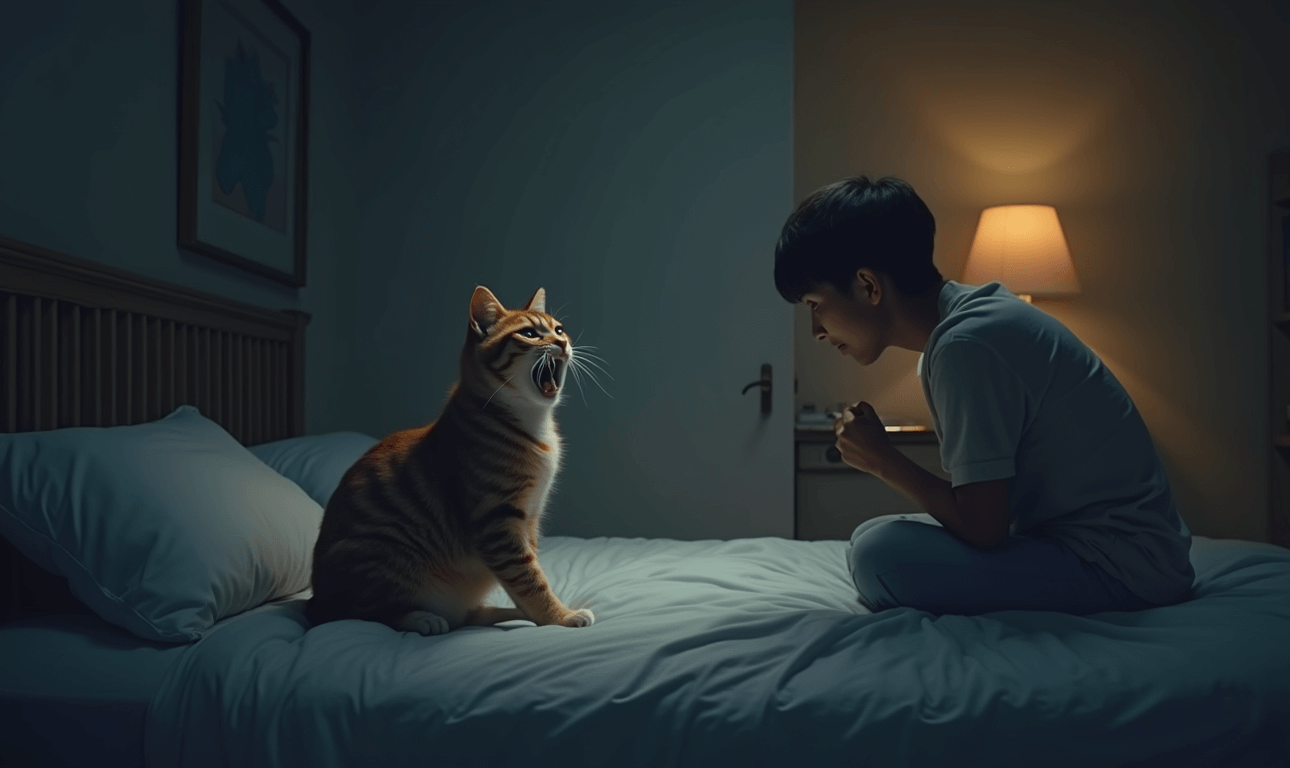Have you ever been woken up by your cat’s insistent meowing in the middle of the night? It’s one of those experiences that can leave you feeling a little confused, perhaps even frustrated, especially if it seems to happen consistently. “Why is my cat meowing at night?” you might wonder as you peer into the darkness, hoping for some sleep. You’re not alone—many cat owners face this issue. In fact, nighttime meowing is a pretty common behavior in cats, but it can happen for various reasons.
In this article, we’ll explore some of the possible causes behind those nighttime vocalizations and offer some tips on how to help your cat—and yourself—get a better night’s sleep. So, if you’ve ever found yourself asking, “Why is my cat meowing at night?” let’s dive into the possibilities together.
Table of Contents
- Why Is My Cat Meowing at Night? Possible Causes
- Why Is My Cat Meowing at Night? Hunger or Thirst
- Why Is My Cat Meowing at Night? Loneliness or Attention-Seeking
- Why Is My Cat Meowing at Night? Health Issues
- Why Is My Cat Meowing at Night? Stress or Anxiety
- How to Stop My Cat from Meowing at Night
- When Should You Worry About Your Cat’s Meowing at Night?
- Frequently Asked Questions
- Conclusion
Why Is My Cat Meowing at Night? Possible Causes
Understanding the reasons behind your cat’s meowing at night can help you address the issue effectively. Let’s take a look at some common causes behind your cat’s nocturnal vocalizations.
Why Is My Cat Meowing at Night? Hunger or Thirst
It’s likely that your cat’s meowing is a plea for food or water, especially if they’re used to being fed at a certain time. Cats are creatures of habit, and they often remember their feeding schedules. If you’re trying to sleep but your cat is meowing loudly for food, it could simply mean they’re hungry. In some cases, cats may also be thirsty and vocalize as a way of reminding you to refill their water bowl.
Solution: Try feeding your cat a little later in the evening or offering a small snack before bed. This may help reduce the chances of them meowing in the middle of the night.
Why Is My Cat Meowing at Night? Loneliness or Attention-Seeking
Is your cat meowing just to get your attention? Cats are social animals and can get lonely, particularly if they’re used to spending a lot of time with you during the day. If you’ve been busier than usual, your cat might be feeling neglected and will start vocalizing to get you to engage with them.
Solution: Spend a bit more quality time with your cat in the evening. Play with them or offer some affection before bed. Sometimes, a little extra attention can go a long way in calming their nighttime restlessness.
Why Is My Cat Meowing at Night? Health Issues
If your cat’s nighttime meowing is suddenly more persistent or intense, it could be due to health problems. Cats with arthritis, dental pain, or other health conditions may vocalize more at night when they’re trying to get comfortable. Additionally, older cats or cats with cognitive dysfunction syndrome (a form of dementia) may become disoriented and anxious during the night, leading to increased meowing.
Solution: If you suspect health issues, a visit to the vet is in order. A professional can help rule out any underlying medical conditions that might be causing your cat’s nighttime vocalizations.
Why Is My Cat Meowing at Night? Stress or Anxiety
Like people, cats can experience anxiety, and nighttime meowing might be a response to stress. Changes in their environment, such as new people, new pets, or even a change in furniture, can unsettle them. Cats are creatures of habit, and disruption to their routines can lead to anxiety.
Solution: Try to keep your cat’s environment calm and predictable. You might also consider using calming products, such as pheromone diffusers, which can help reduce stress-related meowing.
How to Stop My Cat from Meowing at Night
If you’re wondering “How do I stop my cat from meowing at night?”, here are a few strategies to minimize the noise:
- Establish a Routine: Cats thrive on consistency. If you establish a feeding and playtime routine in the evening, your cat will begin to associate those activities with winding down for the night.
- Ignore the Meowing (When Appropriate): It can be tempting to get up and attend to your cat’s meowing, but this might reinforce the behavior. If your cat realizes that meowing leads to attention, they may continue doing it.
- Provide a Comforting Space: If your cat is anxious or lonely, creating a cozy, safe space for them to sleep in can help. Some cats prefer having their own quiet corner, away from the hustle and bustle of the household.
- Offer Interactive Toys: Sometimes, a little entertainment can distract your cat from the urge to meow. Interactive toys or puzzle feeders can keep them occupied during the night.
- Consult Your Vet: If none of the above solutions work, or if you suspect your cat’s meowing is due to health issues, don’t hesitate to reach out to your vet. They can provide insights or suggest treatments for underlying conditions.
When Should You Worry About Your Cat’s Meowing at Night?
If your cat’s meowing becomes excessive or if it’s accompanied by signs of distress or health problems (like changes in eating habits, lethargy, or weight loss), it’s important to take action. Prolonged, intense meowing that seems out of the ordinary should not be ignored. Always trust your instincts as a pet owner—if something doesn’t seem right, it’s best to seek professional advice from a vet.
Frequently Asked Questions
1. Why does my cat meow at night even though they’re not hungry?
Sometimes, cats meow at night for reasons other than hunger, such as loneliness, anxiety, or discomfort. They might want attention, or they may feel restless and unsettled.
2. Is it normal for my cat to meow in the middle of the night?
Yes, some meowing at night is normal, especially if your cat is naturally more active during the evening hours. However, if the meowing becomes excessive, it could indicate a deeper issue.
3. How can I stop my cat from meowing all night?
Start by ensuring your cat is well-fed, comfortable, and mentally stimulated. Establish a consistent bedtime routine, and consider ignoring excessive meowing to avoid reinforcing the behavior.
Conclusion
Understanding why your cat meows at night can help you address the issue effectively. Whether it’s hunger, loneliness, or something more serious, pinpointing the cause is the first step toward a peaceful night’s sleep for both you and your cat. By providing comfort, attention, and proper care, you can create a better environment for your feline friend, making those midnight meows a thing of the past.






